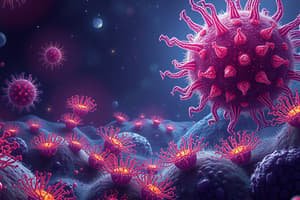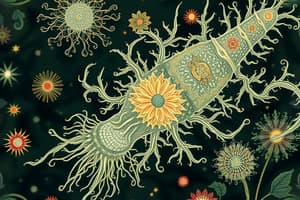Podcast
Questions and Answers
What is the primary purpose of classification in biology?
What is the primary purpose of classification in biology?
- To identify the characteristics of living organisms
- To classify microorganisms into different domains
- To group living organisms based on their shared characteristics and evolutionary relationships (correct)
- To study the behavior of microorganisms
Which of the following is NOT a characteristic of microorganisms?
Which of the following is NOT a characteristic of microorganisms?
- Complex structure (correct)
- Ability to reproduce rapidly
- Ability to adapt to different environments
- Small size
What is the main difference between prokaryotes and eukaryotes?
What is the main difference between prokaryotes and eukaryotes?
- Cell wall composition
- Mode of reproduction
- Ability to adapt to different environments
- Presence or absence of a true nucleus (correct)
Which domain of microorganisms includes protists, fungi, and some algae?
Which domain of microorganisms includes protists, fungi, and some algae?
What is an example of a harmful bacterium?
What is an example of a harmful bacterium?
Which of the following is NOT a type of microorganism?
Which of the following is NOT a type of microorganism?
What is a characteristic of archaea?
What is a characteristic of archaea?
Which of the following is a benefit of microorganisms?
Which of the following is a benefit of microorganisms?
Flashcards are hidden until you start studying
Study Notes
Classification of Living Organisms
- Classification is the process of grouping living organisms based on their shared characteristics and evolutionary relationships.
- The most widely used system of classification is the five-kingdom system, which divides living organisms into:
- Monera (bacteria and cyanobacteria)
- Protista (protozoa, algae, and fungi-like organisms)
- Fungi
- Plantae (plants)
- Animalia (animals)
Characteristics of Microorganisms
- Microorganisms are living organisms that are too small to be seen with the naked eye.
- They can be found almost everywhere, including in soil, water, air, and the human body.
- Characteristics of microorganisms include:
- Small size
- Simple structure
- Ability to reproduce rapidly
- Ability to adapt to different environments
- Can be beneficial or harmful to humans and the environment
Classification of Microorganisms
- Microorganisms can be classified based on their cell structure, metabolism, and other characteristics.
- The three main domains of microorganisms are:
- Archaea: ancient microorganisms that thrive in extreme environments (e.g. hot springs, salt lakes)
- Bacteria: microorganisms that lack a true nucleus and are typically found in soil, water, and the human body
- Eukarya: microorganisms with a true nucleus, including protists, fungi, and some algae
- Microorganisms can also be classified as:
- Prokaryotes: microorganisms without a true nucleus (bacteria and archaea)
- Eukaryotes: microorganisms with a true nucleus (protists, fungi, and some algae)
Types of Microorganisms
- Bacteria:
- Examples: E. coli, Staphylococcus aureus, Bacillus subtilis
- Can be beneficial (e.g. gut flora) or harmful (e.g. pathogens)
- Viruses:
- Not considered living cells, but can replicate inside host cells
- Examples: influenza, HIV, COVID-19
- Fungi:
- Examples: yeast, mold, mushrooms
- Can be beneficial (e.g. fermentation) or harmful (e.g. fungal infections)
- Protists:
- Examples: protozoa, algae, slime molds
- Can be beneficial (e.g. photosynthesis) or harmful (e.g. parasitic infections)
Classification of Living Organisms
- Classification is the process of grouping living organisms based on shared characteristics and evolutionary relationships
- The five-kingdom system divides living organisms into Monera, Protista, Fungi, Plantae, and Animalia
Characteristics of Microorganisms
- Microorganisms are living organisms too small to be seen with the naked eye
- Found almost everywhere, including soil, water, air, and the human body
- Characteristics include small size, simple structure, rapid reproduction, adaptability, and being beneficial or harmful to humans and the environment
Classification of Microorganisms
- Microorganisms can be classified based on cell structure, metabolism, and other characteristics
- Three main domains: Archaea, Bacteria, and Eukarya
- Archaea: ancient microorganisms thriving in extreme environments
- Bacteria: microorganisms lacking a true nucleus, typically found in soil, water, and the human body
- Eukarya: microorganisms with a true nucleus, including protists, fungi, and some algae
- Microorganisms can also be classified as Prokaryotes (bacteria and archaea) or Eukaryotes (protists, fungi, and some algae)
Types of Microorganisms
Bacteria
- Examples: E.coli, Staphylococcus aureus, Bacillus subtilis
- Can be beneficial (e.g. gut flora) or harmful (e.g. pathogens)
Viruses
- Not considered living cells, but can replicate inside host cells
- Examples: influenza, HIV, COVID-19
Fungi
- Examples: yeast, mold, mushrooms
- Can be beneficial (e.g. fermentation) or harmful (e.g. fungal infections)
Protists
- Examples: protozoa, algae, slime molds
- Can be beneficial (e.g. photosynthesis) or harmful (e.g. parasitic infections)
Studying That Suits You
Use AI to generate personalized quizzes and flashcards to suit your learning preferences.




